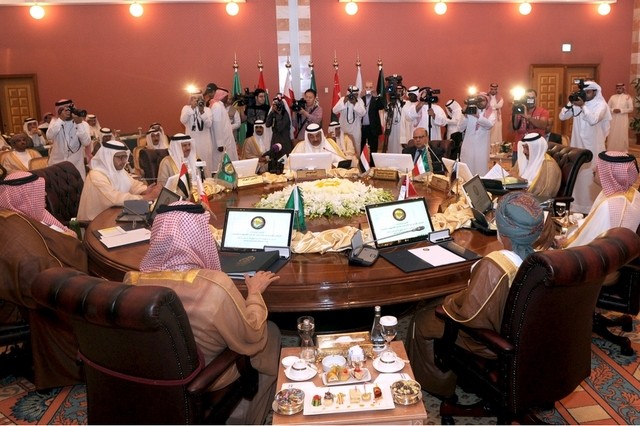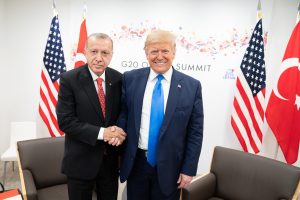by Thomas W. Lippman
Throughout the Middle East, television news broadcasts on state-owned channels have always featured what Western journalists ridicule as “coming and going stories”—a delegation from some country or organization arrives, the delegation meets the king or president, the delegation goes home, perhaps after issuing a bland statement that reveals little about what was discussed.
There have been quite a few of these over the past ten days, but some have been more intriguing than usual. Taken together, they hint at progress in the effort by the United States and its friends to assemble what is known as a “coalition of the willing” to confront the threat from the Islamic State (ISIS).
“Coalition of the willing” may be too generous a description; it’s more a “coalition of the have no other choices.” ISIS, the enemy of pretty much everyone in the neighborhood, seems to be bringing together countries that otherwise have deep differences and longstanding grudges.
This is what Secretary of State John F. Kerry was talking about in an op-ed he published over the weekend in the New York Times. It didn’t attract much attention because it was a holiday weekend and the chattering classes were preoccupied with President Obama’s “We don’t have a strategy yet” gaffe, but in fact Kerry laid out an ambitious plan to forge a broad coalition against ISIS and develop a plan of action. He said he and Defense Secretary Chuck Hagel will go to the region this week to pursue it, and the United States will use its presidency of the UN Security Council this month for Obama to convene “a summit meeting of the Security Council to put forward a plan to deal with this collective threat.”
Judging from the regional “comings and goings” of recent days, the atmosphere may be more receptive. In particular, there were signs that Saudi Arabia and Qatar may be able to put aside their many differences, or at least not interfere with each other, in the face of the ISIS threat.
On Aug. 24, for example, according to the official Saudi news agency, the foreign ministers of Saudi Arabia, Qatar, the United Arab Emirates, Jordan and Egypt met in Jeddah to talk about the war in Syria to discuss the Syrian conflict and other “challenges, including the rise of terrorist extremist ideology.” In an official statement, they expressed their agreement on “the need to seriously work to deal with these crises and challenges to preserve security and stability in Arab countries.”
The next day a senior official of the Iranian foreign ministry was in Saudi Arabia to see the foreign minister, Prince Saud al-Faisal. Little was said officially, but the fact that it happened was important by itself. Saudi Arabia and Iran have long had frosty relations over many regional issues, including Iran’s support for Syria’s president, Bashar al-Assad, whom the Saudis have pledged to overthrow.
After that, Prince Saud, accompanied by Interior Minister Prince Mohammed bin Nayef and the head of Saudi intelligence, went to Doha on what the official news agencies called a “short brotherly visit.” That did not stop the attacks on Qatar in the Saudi media—Salman Aldossary, the editor in chief of the Saudi-owned Al Sharq al Awsat wrote that “the Gulf states can no longer tolerate Doha’s often rebellious policies toward its neighbors. What is also clear is that Qatar can no longer do anything to gloss over its mistakes in this regard”—but it cleared the way for a meeting of the foreign ministers of all six countries of the Gulf Cooperation Council (GCC) at the end of August.
The foreign ministers of Saudi Arabia, Bahrain, Kuwait, Oman, the United Arab Emirates and Qatar issued a joint statement condemning “terrorist groups in Iraq and Syria,” and proclaiming their “firm stances to renounce terrorism and extremism in all its forms and manifestations, whatever its motives and justifications and whatever its source.” They also cited “the importance of cooperation relations between the GCC countries and Iran, based on respecting the sovereignty of countries in the region, non interference in their internal affairs, principles of good neighborhood and refrain from use or threat of force.”
The communiqué said nothing about the fact that Saudi Arabia, Bahrain and the UAE were so angry at Qatar last spring that they pulled out their ambassadors and have not sent them back, nor did it say anything the prime cause of that anger, Qatar’s support for the Muslim Brotherhood, which Saudi Arabia and Egypt have branded a terrorist organization—but some accommodation may be under discussion. Kuwaiti Foreign Minister Sheikh Sabah al-Khaled said the six countries are eager to work out their differences and overcome the “pain” their disagreements have caused.
This week Saudi Arabia’s defense minister, Prince Salman bin Abdul Aziz, has been in Paris to finalize a deal in which the kingdom will pay for French weapons to be supplied to the army of Lebanon, which faces the threat of jihadist extremists coming across the border from Syria. And Germany announced it would supply machine guns, anti-tank missiles and armored vehicles to the Kurdish forces known as peshmerga, who are battling ISIS in Northern Iraq.
This is what Kerry meant when he wrote that “In this battle, there is a role for almost every country. Some will provide military assistance, direct and indirect. Some will provide desperately needed humanitarian assistance for the millions who have been displaced and victimized across the region. Others will help restore not just shattered economies but broken trust among neighbors…. ISIS’ abhorrent tactics are uniting and rallying neighbors with traditionally conflicting interests to support Iraq’s new government. And over time, this coalition can begin to address the underlying factors that fuel ISIS and other terrorist organizations with like-minded agendas. Coalition building is hard work, but it is the best way to tackle a common enemy.”
Photo: The foreign ministers of the GCC meet in Jeddah, Saudi Arabia, on Aug. 30, 2014. Credit: WAM






By theatrically snubbing Bashar Al Assad’s offer to be part of the coalition to fight against ISIS, the US, France and the UK are making a huge mistake. ISIS in Syria cannot be eliminated only by air attacks. There is a need of boots on the ground.Turkey, the only potential provider is totally reluctant to involve its soldiers for fear of internal problems. Therefore the only boots available in Syria are the Syrian Army, Hezbollah and the Kurds in order of power. ( The Free Syrian army has ceased to count as a power)
tSyria wants a recognition of its legitimacy back and Obama cannot admit his 3 years misjudgement.That is probably why Obama has “no strategy” in Syria.
If he finally finds, it is obvious that it would involve the Syrian government, openly or secretly.
Assad will not allow Turkish troops into Syria as it is the Syrians who have been letting foreign jihadists through their southern border to fight against the Assad regime in Syria.
Many of the foreign recruits in the IS, Al Nusra Front and FSA reached them through Turkey.
Assad would be rightly concerned that Turkish troops allowed into Syria they would not leave.
Otherwise, I think you are right and that the “West” and Syria will end up in a tacit coalition.
Now they appear to be enjoying better relations with Iran, maybe they can be the go-between?
CORRECTION –
It is the Turks who have been letting foreign jihadists through their border into Syria and NOT the Syrians.
Let’s be sure to point the blame as well to the major players in the region such as Iran and Saudi Arabia who have historically opposed each other, but the reasons for that opposition lies in the most basic human trait which is the desire to collect and preserve power and influence. In that regard, there are many players in the Middle East who have contributed to the deterioration of regional security and the rise of groups like ISIS. Iran deserves blame for funneling weapons and troops to Syria to prop up Assad and drive ISIS out of Syria into Iraq. It also deserves blame for controlling Maliki in Iraq and emboldening him to form an exclusionary government that allowed Sunni tribes to join with ISIS, including former members of Hussein’s army that now provide tactical expertise on the battlefield. The US deserves blame for Obama laying a proverbial red line in the sands of Syria and then blinking and now failing to articulate a clear policy or strategy of any kind that the region can coalesce around or at the very least debate. We can throw in other countries and the list grows longer and longer with each failure to achieve a regional solution. If there is one constant in the Middle East, no one will cooperate unless someone benefits which is a good recipe for paralysis.
You really need to go back further in time with your analysis to ensure you understand fully what you are saying.
It is a fact that there was no Al Qaeda in Iraq when Saddam Hussein controlled the country.
The fact that the IS has arisen and been partly complemented by the IS forces is due to the fact that the coalition of the stupid – led principally by the US – illegally invaded Iraq in 2003 on an artificially contrived pretext involving alleged weapons of mass destruction (WMD) which the US was either too stupid to know was false or chose to accept the false pretext.
Saddam WAS a son of a hitch but as US officials were always happy to acknowledge during the 8 year proxy war the US waged against Iran – using Saddam and his Iraq armed forces – Saddam was THEIR son of a hitch.
Incidentally, how would YOU feel about a country that waged an 8 year proxy war against your country and used poison gas as part of their military tactics against your soldiers and civilians?
Does this not suggest that far from needing to Change Iran Now you should be advocating to Change US Now?
The true reason for the rise of the IS is the funding, training and arming of the IS by another coalition of the stupid, again involving the US, Saud, Jordan and Turk criminal elites.
Why?
For oil, money, power – whatever.
The gangsters are literally insatiable.
They never know when enough is enough